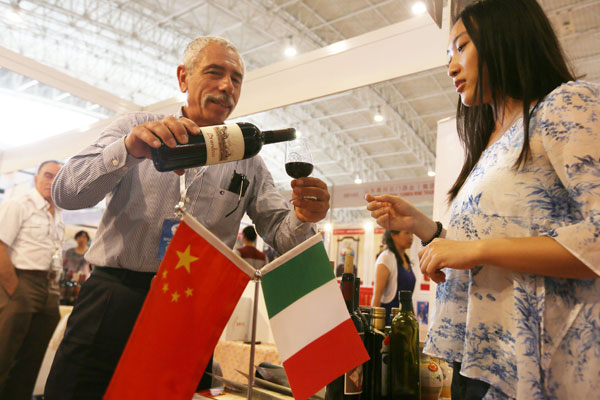 |
|
An employee of an Italian winemaker serves a visitor at a light industry and consumer goods exposition in Beijing. China-Italy trade rose 3.9 percent to $43.33 billion in 2013, according to the General Administration of Customs. LEI KESI / FOR CHINA DAILY |
Committee to facilitate business opportunities in both countries
China and Italy on Tuesday signed a memorandum of understanding to boost trade and investment cooperation between the two countries.
The deal comes ahead of a visit by Italian Prime Minister Enrico Letta to Beijing in April.
Chinese officials called for Italy, which will hold the rotating presidency of the European Union in the second half of the year, to help loosen the bloc's export restrictions on China, fight against trade protectionism and advance the China-EU investment pact.
China's Commerce Minister Gao Hucheng and the visiting Italian Minister of Economic Development Flavio Zanonato on Tuesday signed the MOU to establish a Sino-Italian committee, which will serve as an intermediary for companies from the two sides, Zanonato said during the Sino-Italian Forum for a New Model of Economic and Commercial Cooperation, which was held in Beijing.
The committee, seen as an important vehicle to upgrade the bilateral trade model, will be responsible for dealing with issues in two-way trade as well as tapping new business opportunities in each market.
Meetings will be held once or twice a year in China or Italy and will be mostly linked to high-level visits.
The committee's first meeting will happen in April during the visit of the Italian prime minister to Beijing, Zanonato said.
During Letta's visit, a series of agreements will be signed to improve the business cooperation monitoring process, Italy's Ambassador to China Alberto Bradanini said at the forum.
"Sino-Italian economic cooperation in recent years prioritized four sectors: sustainable urbanization, healthcare, environmental protection and modern agriculture," Bradanini said. "China has eager demand, and Italian industrial businesses are willing to share their know-how and management expertise with their Chinese peers to engage in China's economic growth, which amazed the world in the past three decades."
Wang Shouwen, China's assistant minister of commerce, agreed with that view, while urging more cooperation for R&D projects, brand building and marketing activities as well as increased cooperation between small and medium-sized companies.
"We need to further unleash the potential of bilateral trade and expand the trade volume. China is willing to import more technology and services from Italy," Wang said.
In 2013, Sino-Italian trade rose 3.9 percent year-on-year to $43.33 billion, according to the General Administration of Customs. The country's exports to Italy increased 0.4 percent to $25.76 billion while its imports rose 9.4 percent to $17.58 billion.
In 2012, bilateral trade dropped 18.6 percent year-on-year to $41.73 billion with a trade surplus of $9.59 billion in China's favor, according to the official figures.
"We need to keep working hard on trade. The economic structures of the two countries are complementary, but we also need to resolve the challenges such as the remarkable trade deficit," Bradanini said.
"Two-way investment has very bright prospects as Italian investment in China is not big enough and Chinese investment in Italy has just started. Chinese enterprises are latecomers to international markets but have great potential. Italy wants to be a hot destination for China's overseas investment," said the ambassador.
Wang said that China will improve its investment environment through more protection of intellectual property rights and further relaxation of investment areas for foreign players.
"We'll particularly encourage Italian investment in China to shift toward agriculture, strategic emerging industries and the service sector. Meanwhile, developed companies at home can take part in Italy's privatization process," Wang said. "On the other hand, we expect more facilitation on visas and residence permits from Italy."
He added that China is also revising its laws on foreign direct investment to provide a stable, transparent and predictable environment as well as boost foreign investors' confidence in the nation.
